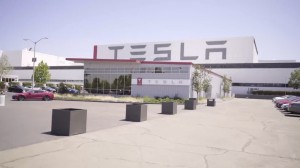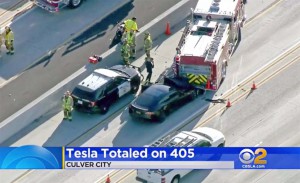Tesla stock is getting pummeled by investors over growing concerns about the company’s cash coffers, a crash that is raising serious concerns about its vaunted Autopilot technology, and the ongoing “manufacturing hell” at the automaker’s assembly plant in Fremont, California.
TSLA shares briefly crashed through their 52-week low Thursday morning before staging a modest rebound. But the once high-flying stock has clearly been wounded and is now running about a third below its 52-week high.
“Reality is setting in,” said Joe Phillippi, head of AutoTrends Consulting, and a long-time Wall Street automotive analyst. Investors, he said, “were banking on increased earnings…once they got their manufacturing system fixed. It was going to be a no-brainer.”
In fact, despite repeat assurances from Tesla founder and CEO Elon Musk, the Fremont plant has continued to lag well behind earlier projections, with almost no one expecting it to reach 5,000 vehicles a week anytime soon, never mind the 10,000 target Tesla had originally projected when it launched production of the Model 3 last July.
(Tesla shareholders approve multi-billion dollar package for Musk. Click Here for details.)
The sedan is Tesla’s first mainstream entry and was expected to transform it into a volume manufacturer. But Musk warned that there would likely be “production hell” following the start-up. If anything, he underestimated the challenges.
Among other things, Tesla has been stung by recent news reports citing current and former employees who claimed the carmaker has been dealing with an unexpectedly high level of faulty parts and components for the Model 3. Tesla tried to downplay that by arguing that isn’t uncommon. But Phillippi and other analysts contend the company didn’t properly validate its manufacturing system or the capabilities of key suppliers to head off preventable problems.
The company will soon reveal the latest production data on the Model 3 and observers warn another shortfall from the company’s most recent forecast could send more investors scurrying for the doors.
Tesla insists it has not shipped defective vehicles to buyers, but despite generally positive reviews for the Model 3, analyst Dave Sullivan, of AutoPacific, Inc., cautioned that Model 3 buyers will be far less tolerant of quality and reliability issues than those who’ve purchased an older and more expensive Model S sedan or Model X battery-electric SUV.

Tesla's Fremont plant is churning out poor quality parts and vehicles, say current and former employees.
Even if quality doesn’t prove an issue for buyers, one of the big challenges for Tesla will be hanging onto the more than 400,000 consumers who reportedly placed advance orders for the Model 3. That prospect has been looming larger as more and more competitors enter the long-range, affordable electric-vehicle space. Kia is the latest, this week unveiling its Kona battery-SUV at the New York International Auto Show. The Korean model is rated at 250 miles per charge, 30 more than the Model 3.
(Click Here to check out the new Hyundai Kona Electric.)
Even losing the deposits from advance orders – about $850 million in total — could be a critical problem for Tesla as it is facing an increasing cash drain. The Wall Street Journal reported on Wednesday that the automaker spent $3.4 billion in free cash during 2017.
“This business devours cash,” analyst Phillippi told TheDetroitBureau.com, echoing the WSJ’s red flag that Tesla could run out of cash by the end of 2018, all the more rapidly if Model 3 production continues to lag. It doesn’t help that the company has $10 billion in long-term debt and $23 billion in overall liabilities.
(Tesla struggling with major quality issues. Click Here for the story.)
Moody’s this week downgraded Tesla’s debt and many observers fear the company could water down its stock by going back to the well with another equity offering if it can’t boost Model 3 production in a hurry.
The problems for Musk and company seem to be coming from every corner lately. There are renewed questions and legal challenges to its purchase of Solar City, the solar cell company started by a Musk relative.
And one of the key factors behind this week’s TSLA stock plunge appears to be the news that federal safety regulators will be probing both a March 23 crash of an autonomous Uber vehicle and an incident in which a Model 3 ran into the back of a firetruck in suburban Los Angeles. The Tesla vehicle was reportedly operating in semi-autonomous mode at the time.
Tesla has heavily promoted its Autopilot technology and has said it plans to upgrade it to fully autonomous in the near future. As with its past production promises, analysts and investors are worried that Musk simply won’t be able to deliver, at least, not on time.


